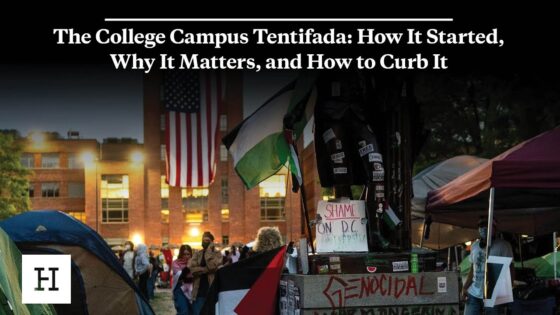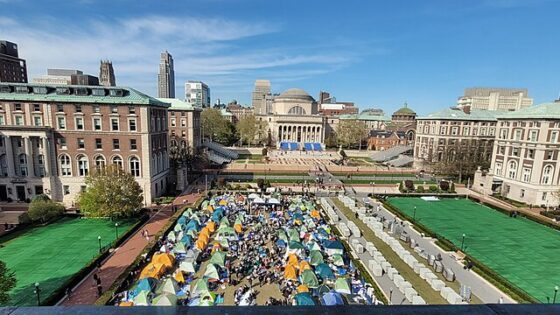AN UPDATE FROM THE BROWN HILLEL DIRECTOR
Serena Eisenberg
The real story of Nonie Darwish’s appearance at Brown University is both simpler and more complex than news stories have reported.
According to news reports, Moslem students pressured Jewish students to cancel a talk by Nonie Darwish, who is an outspoken Arab supporter of Israel. In this case, Moslems on campus did express concerns about some of Darwish’s writings.
As Brown students are wont to do, the Hillel student leaders researched extensively and deliberated thoughtfully. They read some of Darwish’s writings as characterizing religious Moslem women who wear a veil as jihadists, or terrorists, a stereotype that the Jewish student leaders themselves found offensive. The Hillel student leaders, believing Hillel not to be the appropriate venue for Darwish, made a difficult decision not to be the sole sponsors of Darwish’s talk.
The university administration stepped in to sponsor the event. So, in fact, Nonie Darwish is coming to Brown; her talk is scheduled for early next semester.
On the one hand, the critical importance of free speech demands that we err on the side of airing controversial viewpoints so that all can hear, debate, and even disagree. Universities must maintain themselves as places where even repugnant ideas can be openly expressed – and then refuted. And sponsoring a speaker does not imply endorsement of every word ever said or written.
On the other hand, universities are communities, and the maintenance of peaceful, respectful relationships is a critically important value. The Talmud teaches a principle of “mipnei darchei shalom” — decision-making based on a concern for keeping peaceful relationships.
On our campus, religious Muslims live as roommates with religious Jews, praying and celebrating and learning together about one another’s faiths, history, and politics. Brown students seek constructive dialogue on complex Middle East Issues. There is good reason why Brown’s campus has been lively, not toxic.
Certainly, Jewish organizations need to lead discussions about the rise of radical Islam, as Jews and Israel stand as the primary targets of this ideology. We at Hillel recognize that we are stronger — the
University is stronger — when we act together with groups in the broader community.
Young people across the country are wrestling, as generations have done before them, with the challenging questions of free speech. One may be tempted to see these students as intimidated or naïve. They are not.
These are the savvy and refreshing voices of our future leaders.
**********
STATEMENT FROM BROWN HILLEL
Brown Hillel is pleased to announce that the Brown administration has agreed to host Ms. Nonie Darwish’s appearance, and students are working with university officials to confirm further details of her upcoming talk.
Brown Hillel is proud of our history of Israel advocacy on campus, which includes supporting several student groups and the sponsorship of a variety of speakers — some controversial – such as Irshad Manji.
In this particular case, one group of Jewish students on campus sought to bring Nonie Darwish to Brown in order to provide a former insider’s perspective on radicalism in the Muslim world. These students made a proposal to the student executive board of Hillel, who after much deliberation, made a decision not to sponsor the event.
It was a difficult decision for the Hillel executive board, but one which, from their perspective, reflected a concern that being the sole sponsor of her visit would not be a prudent method of Israel advocacy.
The president of the Brown Hillel Board of Trustees, Fred Horowitz, reminds that our Hillel’s core strength is that we put our full faith in empowering our students to wrestle with challenging questions:
“There will be times, such as this one, where many of us do not agree with their decisions, but that is the price of real student leadership.
Our elected student leadership invested the time and rigorously debated the issues involved in the manner that our board expects.
“It was the students who understood the difficulty in Hillel’s sole sponsoring a speaker who has made many anti-Islam statements. Although I would enjoy hearing Darwish speak at Brown, or anywhere, we must remember that Brown Hillel is not anywhere.
“Our student leadership has built a unique relationship with the Brown Muslim community. Some of us may perceive it as naïve, but that urge to break the mold of Jewish- Muslim dialogue is what makes Brown Hillel unique.
“It is no accident that Brown does not face the same issues as Columbia and I really believe that the bridges our students are building will keep all dialogue on a level that vastly surpasses that which is called dialogue outside of the campus. I am also confident that our student leadership is utterly committed to the hard work of educating their fellow students about Israel’s right to exist.”
We thank you for attempting to look beyond the headlines to understand the complexities of Israel advocacy on this challenging arena of the Brown campus. We look forward to hearing Ms. Darwish’s perspective on the threat of radical Islam, a message that needs to be heard both at Brown and on campuses around the nation.
**********
STATEMENT OF BROWN UNIVERSITY
The Brown University community values the contributions of affiliated student religious groups and supports open discussion among people of all faiths and religious beliefs. Administrative officials at Brown are working with student groups to discuss alternative ideas for sponsoring a Nonie Darwish presentation on campus.
JFR: THE JEWISH FACULTY ROUNDTABLE




